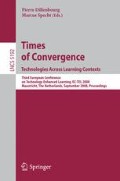Abstract
Designing learning-software for a special target group should not only focus on the pupils but also on the teacher. The propagation of using computers for everyday teaching should take into account teachers’ possible lack of technical competence. Thus, there are two gaps which have to be bridged: One for the pupils using a computer to learn and the other for the teacher preparing tasks within this learning environment.
Access this chapter
Tax calculation will be finalised at checkout
Purchases are for personal use only
Preview
Unable to display preview. Download preview PDF.
References
Iacono, T.A., Miller, J.F.: Can microcomputers be used to teach communication skills to students with mental retardation? Education and Training in Mental Retardation 24, 34–44 (1989)
Wehmeyer, M.L.: National survey of the use of assistive technology by adults with mental retardation. Mental Retardation 36, 44–51 (1998)
Parette, H.P.: Assistive technology devices and services. Education and Training in Mental Retardation and Developmental Disabilities 32, 267–280 (1997)
Abbott, C.: e-Inclusion: Learning Difficulties and Digital Technology. Futurelab Series, Bristol (2007)
Bradburn, E., Pearson, E.: From inclusive guidance to inclusive online teaching practive – a tool to help planfor student diversity. In: Proceedings of 6th IEEE International Conference on Advanced Learning Technologies, pp. 540–541 (2006)
Lingnau, A., Kuhn, M., Harrer, A., Hoppe, H.U.: Empowering Teachers to Evolve Media Enriched Classroom Scenarios. Research and Practice in Technology Enhanced Learning 2(2), 105–129 (2007)
Zentel, P., Lingnau, A., Ratzke, E.: A multi-media software environment for children with cognitive disability. In: Proceedings of Society for Information Technology and Teacher Education International Conference, Chesapeake, VA, AACE (2007)
Cress, U., Kimmerle, J.: Systemic and Cognitive Perspective on Collaborative Knowledge Building with Wikis. International Journal of Computer-Supported Collaborative Learning (in press, 2008)
Harrer, A., Zeini, S., Ziebarth, S., Münter, D.: Visualisation of the dynamics of computer-mediated community networks. In: INSNA Sunbelt Conference (2007)
Author information
Authors and Affiliations
Editor information
Rights and permissions
Copyright information
© 2008 Springer-Verlag Berlin Heidelberg
About this paper
Cite this paper
Lingnau, A., Harrer, A. (2008). Designing Software for Pupils with Special Needs: Analysis of an Example for Complementary Action Design. In: Dillenbourg, P., Specht, M. (eds) Times of Convergence. Technologies Across Learning Contexts. EC-TEL 2008. Lecture Notes in Computer Science, vol 5192. Springer, Berlin, Heidelberg. https://doi.org/10.1007/978-3-540-87605-2_27
Download citation
DOI: https://doi.org/10.1007/978-3-540-87605-2_27
Publisher Name: Springer, Berlin, Heidelberg
Print ISBN: 978-3-540-87604-5
Online ISBN: 978-3-540-87605-2
eBook Packages: Computer ScienceComputer Science (R0)

